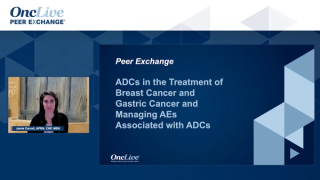
Breast Cancer
Latest News
Latest Videos

More News

Compared with available literature, the rates of medication-related osteonecrosis of the jaw were higher in patients with breast cancer and bone metastases treated with antiresorptive therapy.

Increased use of consultations, breast MRIs, genetic counseling, and other testing in high-risk patients were a direct result from nurse-led high risk referral protocols.

A learning approach integrating time series and static data may improve understanding of breast cancer outcomes.

Genetic testing offers potential benefits after a cancer diagnosis by potentially reducing the risk for cancer in families with hereditary cancer syndromes and managing treatment.

Fast track designation has been granted from the FDA to HP518 to treat androgen receptor–positive triple-negative breast cancer.

Crofelemer missed the diarrhea endpoint in a study assessing prophylaxis in adult patients with solid tumors receiving targeted therapy.

Findings from this study also demonstrate statistically meaningful improvements in breast cancer–specific quality of life and endocrine symptoms with acupuncture.

An expert explores the complexities of immunotherapy during pregnancy, highlighting risks to the fetus and the crucial role of oncology nurses in patient education and management.

This recommendation is an update to the 2020 ASCO guideline on optimal adjuvant chemotherapy and targeted therapy for the treatment of breast cancer.

With several options available for the second-line treatment of HR-positive, HER2-negative mBC, an expert emphasized the importance of tailoring treatment for every patient.

An oncology nurse's experience with her mother's cancer and her own BRCA2 diagnosis shapes her approach to patient care.

Assisted reproductive techniques may be safe for patients with BRCA-mutated breast cancer, according to an ESMO study.

Compared with combination chemotherapy, ribociclib plus endocrine therapy provided a significant progression-free survival benefit in HR-positive, HER2-negative advanced breast cancer.

What should a patient do when there is an incidental finding on radiographic films? Is the patient responsible for following up, or is it the responsibility of the provider who ordered the imaging? What if they had the imaging done at an urgent care center or in the emergency department and they do not have a primary care provider?

The ready-to-dilute formulation of Tepylute for breast and ovarian cancers can help to reduce prep time and provide more accurate dosing.

Treatment sequencing data indicated that most patients with HER2-positive metastatic breast cancer discontinued second-line treatment in US community practices.

Compared with fulvestrant alone, abemaciclib plus fulvestrant improved progression-free survival in select patients with hormone receptor–positive/HER2-negative advanced breast cancer.

Patients with HER2-positive early breast cancer derived similar outcomes whether they received subcutaneous or intravenous pertuzumab and trastuzumab plus chemo.

Treatment with fuzuloparib, either with or without apatinib, provided superior progression-free survival benefit compared with chemotherapy in HER2– metastatic breast cancer with germline BRCA1/2 mutations.

Adding inavolisib to palbociclib and fulvestrant improved results for HER2-negative, hormone receptor–positive, PIK3CA-mutated advanced or metastatic breast cancer.

Anthracycline Plus Chemo Lowers Risk for Recurrence in MP High-2–Risk, HR+/HER2– Early Breast Cancer
Patients with MammaPrint high-2–risk, BluePrint Luminal B, HR-positive, HER2-negative breast cancer had improved recurrence-free survival when treated with anthracycline/taxane/cyclophosphamide.

Patients with HR-positive, HER2-low, and -ultralow metastatic breast cancer treated with trastuzumab deruxtecan obtained a PFS benefit vs chemotherapy.

Most survivors of stage I-III breast cancer who attempted pregnancy succeeded, though there were certain factors that seemed to increase the chance of conception.

Adding capivasertib to fulvestrant was shown to improve the time to second progression in patients with pretreated HR-positive, HER2-negative advanced breast cancer.

Compared with physician’s choice of treatment, trastuzumab deruxtecan exhibited superior long-term survival and response rates in patients with HER2-positive breast cancer.








































































































